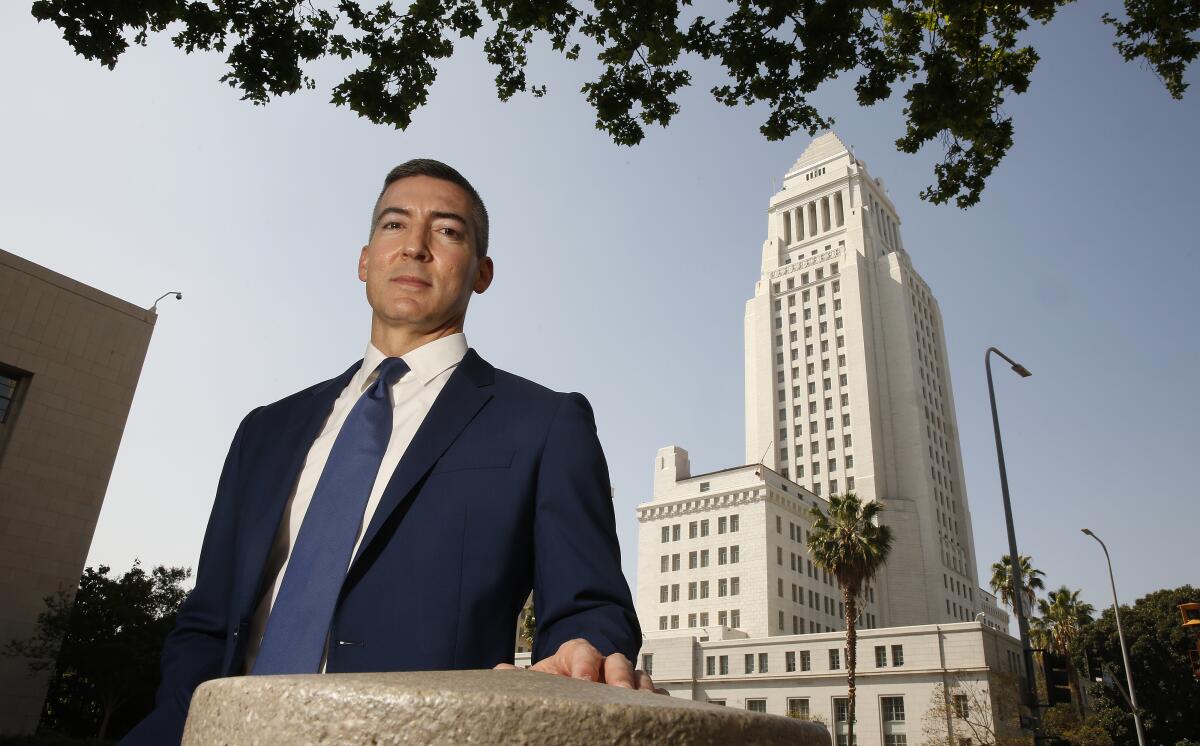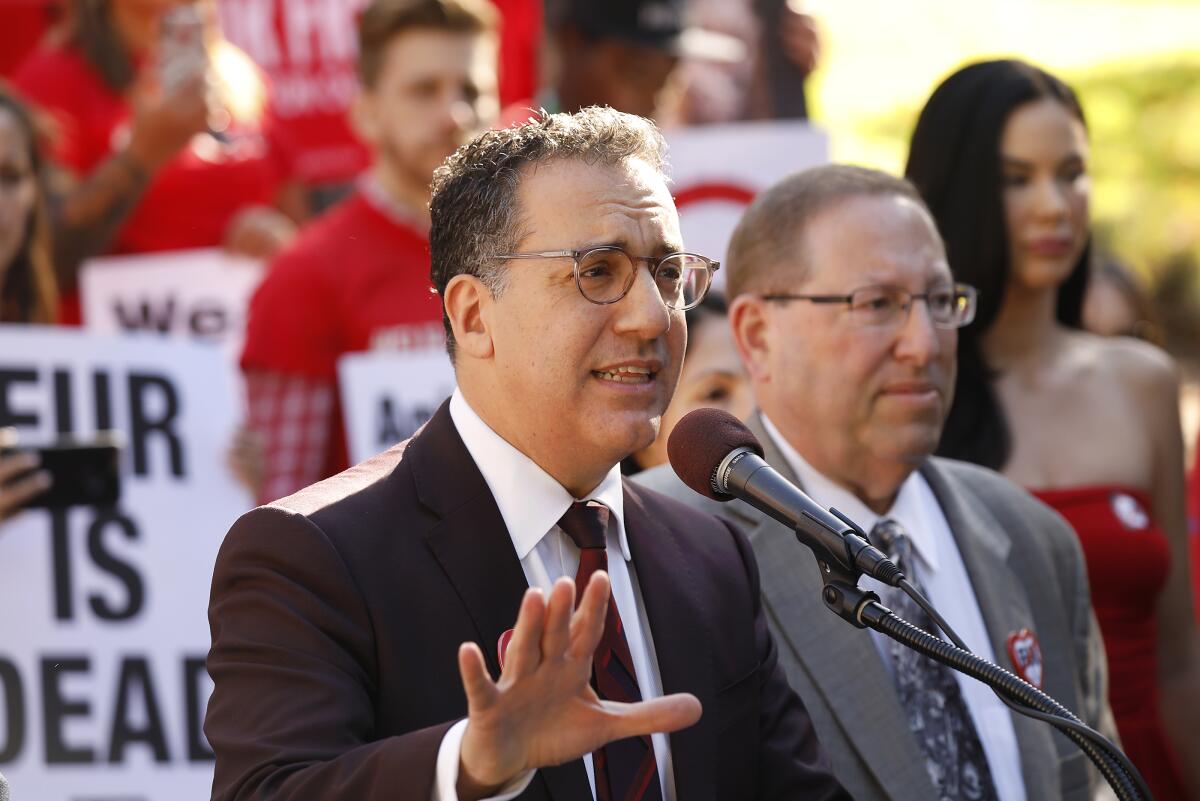L.A. cut the police budget, then put $47 million in overtime on the city’s ‘credit card’

- Share via
Faced with massive demonstrations over the murder of George Floyd, the Los Angeles City Council took a dramatic and symbolic step last year, cutting $150 million from the Police Department’s budget and promising to put that money into other social services.
Council members found much of the savings by slashing the funding available for LAPD overtime. But before they did, they received a warning: Many officers would end up working overtime anyway, and if there wasn’t enough money to pay them, those hours would wind up on the city’s so-called credit card.
The predictions, as it turned out, were spot on.
During the budget year that ended June 30, LAPD officers worked more than 680,000 overtime hours for which they have not yet been compensated, according to figures provided to The Times by the LAPD and the city’s financial analysts. Those hours, currently valued at $47.3 million, represent nearly a third of last year’s cut to the LAPD.
When those officers get paid, potentially years in the future, the cost will almost certainly be more expensive, said Dustin DeRollo, spokesman for the Los Angeles Police Protective League, the union that represents rank-and-file LAPD officers. That’s because that delayed overtime must be paid at an officer’s most recent salary, which is typically higher than when they worked the hours, because of pay increases or other factors.
“There’s an increased cost to taxpayers, because they’ll be paying out those overtime hours at a higher rate later on,” DeRollo said.
The LAPD has a long history of asking officers to work overtime now and get paid much later, a practice sometimes referred to as “overtime banking.” But in the wake of the financial crisis sparked by COVID-19, and an outbreak of citywide protests over police brutality, the practice has exploded.
During the 2018-19 fiscal year, the city banked $13.4 million worth of overtime. The following budget year, which took in four months of COVID-19 and weeks of protests over Floyd’s murder, the number topped $28 million.
Last year’s $47.3 million in unpaid hours expanded the overtime bank even more, taking the total to $154 million. Those hours are now a liability that rating agencies take into account when determining the city’s creditworthiness.
And the longer the city delays payment on that overtime, the more expensive those hours can become. Officers might be compensated within a few years, after they have had two or three raises. Or they might not be paid until their retirement, after they have received multiple promotions and are earning their last, highest salary.
The growing pot of unpaid overtime troubles some of the activists who have demanded that city leaders defund the LAPD.
Last year’s cut to the police budget was billed by council members as a way to free up money for social service programs in low-income communities. By postponing payment on tens of millions in overtime, the city will in fact have fewer dollars available in future years to spend on alternatives to policing.
“I look at it now as theater,” said Albert Corado, an activist and council candidate who has been calling for the LAPD budget to be zeroed out. “People were calling for the defunding of the police, and it was theater.”
‘Not being honest’
Critics have long assailed the city’s practice of overtime banking, saying it hides the true cost of policing while saddling future taxpayers with the bill for services already rendered.
“It’s not being honest with Angelenos,” said Jack Humphreville, who belongs to the Neighborhood Council Budget Advocates, which monitors city spending. “In the budget, they’re not accounting for these 680,000 hours of work. It’s a fraud.”
City Administrative Officer Matt Szabo, the high-level budget analyst who advises Mayor Eric Garcetti and the council, acknowledged that the sharp growth in banked overtime has been “far from ideal,” saying the practice should be reserved for major financial emergencies. Police deserve to be paid their hours in real time, he said.
“Forced banking is unfair to our officers, unsound financially and should only be used as a temporary measure to weather serious crisis,” he said.
When the council cut the LAPD budget last year, the city was facing a huge budget shortfall, had drained much of its reserve and was contemplating furloughs for nearly 16,000 employees. This year, after receiving a nearly $1.3-billion federal aid package, the council allocated far more for police overtime, allowing the LAPD to return to a mostly pay-as-you-go arrangement, Szabo said.
Szabo said he does not yet know when last year’s banked overtime will be paid out. The next major opportunity could come in 2023-24, when the police union’s contract calls for up to $35 million in overtime payouts.

The LAPD did impose significant cuts during last year’s financial crisis, reducing the number of overtime hours worked from 2 million in 2019-20 to roughly 825,000 hours last year. Those figures do not include staffing provided to the Metropolitan Transportation Authority, which has its own agreement for police services.
“The department reacted responsibly and reduced overtime hours to minimize the impact as much as possible,” LAPD Police Administrator Thom Brennan said in an emailed statement.
Of the 825,000 overtime hours worked in 2020-21, more than four out of every five hours were banked. The largest share of those hours went toward operations — a category that includes routine patrols, minimum staffing and violent crime task forces — and investigations.
The LAPD relied on banked overtime when officers went to court hearings, took medical exams or were assigned to demonstrations or social unrest. Officers banked overtime during major events, such as the street celebrations that broke out when the Dodgers won the World Series and the Lakers won the NBA title.
The outbreak of COVID-19 pushed LAPD staffing to its limit last year, with thousands of officers contracting the virus, causing them to miss work while they recovered or remained in quarantine. Several hundred officers resigned or retired, leaving the department well below its budgeted staffing.
‘A very expensive credit card’
This is not the first time the city has relied on delayed overtime payments to weather a financial crisis. After the 2008 recession, Mayor Antonio Villaraigosa dramatically increased the amount of overtime that officers could bank.
At the time, Villaraigosa was heavily focused on shielding the LAPD from reductions. By the time he left office, the LAPD’s overtime bank had grown to 2.6 million hours, with the city owing officers $130 million, budget officials said.
As the economy recovered, Garcetti and the council budgeted more money for overtime and paid off some of those outstanding bills, taking the total down to about $108 million.

In June 2020, the city’s financial analysts warned that the practice of overtime banking could increase once again if council members went ahead with its planned cut to the LAPD, which included a $97-million reduction to overtime. Councilman Bob Blumenfield, who sits on the budget committee, voiced his own concerns, comparing the practice to the use of a “very expensive credit card.”
“We’re basically paying a very high interest, because people are going to get paid back at a much higher rate,” he said.
The council used a third of the $150-million cut to the LAPD to balance the budget and eventually devoted the remainder toward jobs programs, anti-gang initiatives, universal income programs, homeless services and other priorities.
DeRollo, the police union spokesman, argued that the overtime funds were needed all along — and that the council’s cut simply shifted the burden of last year’s personnel costs onto future taxpayers. The delayed payments also hurt morale at the LAPD, with some officers working dozens of hours without getting paid, he said.
“For some, they might not be able to get compensated for those hours for 20 years,” DeRollo said.
Council President Nury Martinez, who spearheaded the push for the $150-million cut, defended the decision to shift money away from the department, saying the move helped neighborhoods that have long experienced underinvestment.
“Regardless of any inevitable overtime pay, it’s undeniable that this council has listened and is focused on creating a more equitable city,” she said.
Times staff writer Kevin Rector contributed to this report.
More to Read
Sign up for Essential California
The most important California stories and recommendations in your inbox every morning.
You may occasionally receive promotional content from the Los Angeles Times.










